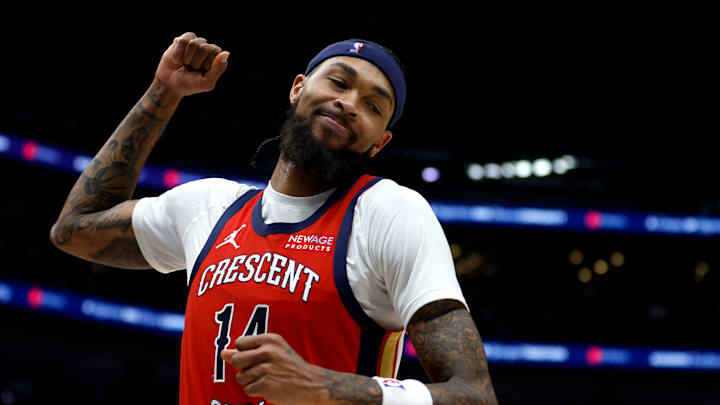The Toronto Raptors made a bold trade last year, bringing in former Los Angeles Lakers and New Orleans Pelicans forward Brandon Ingram -- and handing him a fat new contract. Ingram had wanted to be paid like a star for years, and the Raptors finally granted his wish.
If you want to be confused about how good an NBA player is, send them to New Orleans. One of the most poorly-run franchises in the league has built rosters year after year that do not fit together. When you add in that the team has also dealt with a shocking number of injuries, you get an environment that obscures player evaluations like a full solar eclipse.
Is Brandon Ingram good? That seems fairly certain. Across six seasons in the Big Easy, Ingram put up 23 points, five rebounds and five assists while hitting just under two 3-pointers per game at 37 percent. He made just one All-Star Game all the way back in 2019-20, but he also has a dominant postseason series to his name, dropping 27-6-6 on the Phoenix Suns in 2022.
Ingram has made it clear for years that he wanted to sign a long-term max contract with the Pelicans, but New Orleans never offered one. And it's not difficult to see why. Despite his solid counting stats, there are numerous yellow flags that pop up around Ingram. Can he stay healthy? Will his game scale next to another star? Can he become a knockdown shooter instead of merely a fine one?
The Pelicans could never answer those questions, not with Zion Williamson in-and-out of the lineup and inconsistency at center and an eclectic collection of guards, none of whom excelled at setting up their teammates. In six seasons, Ingram and Zion played less than two full seasons worth of games together, so the questions largely went unanswered.
The Raptors swooped in and paid Brandon Ingram
What the standoff between Ingram and the Pelicans created was a buy-low opportunity. A team prepared to grant Ingram his wish and give him a large contract could trade for him at a discount relative to his production. The internal leverage of the Pelicans to demand a large return was low.
The uncertainty swirling around Ingram not only depressed his financial market, it lowered the interest of other teams to trade for him. Would he fit next to their incumbent stars? Could they build an offense around him? With most teams out as trade partners, the external leverage was lowered as well.
That is when the Raptors struck, trading pending free agent Bruce Brown, backup big Kelly Olynyk, a 2026 first and a 2031 second for Ingram. For a player who is ostensibly on the fringes of the All-Star conversation, it was a bargain. Yet all of the caveats apply as to whether Ingram can be that player.
The Raptors certainly hope he can be, as they immediately signed Ingram to a three-year, $120 million contract extension that kicks in this upcoming season. $40 million is no longer max money, but in the complicated and restrictive new cap environment it's a lot of money to commit to a player. Yet the Raptors made the deal with the extension in place, doing for Ingram what the Pelicans refused to do.
Will it work out? Time will tell. There are a lot of positive outcomes ahead -- but plenty of negative ones as well. One thing is clear: Brandon Ingram didn't feel valued by the New Orleans Pelicans. The Raptors started things off on the right foot by trading for and paying Ingram. Now the real work begins.
